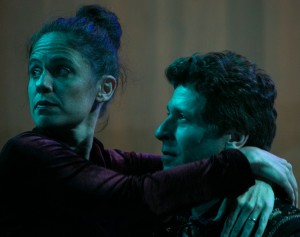There’s a neon display over the mezzanine bar in the spanking new A.R.T./New York Theatres on 53rd Street that reads, “Why are you here and not somewhere else?” It’s an apt distillation of Richard Maxwell’s eccentric Samara, which has just opened there. Maxwell’s odyssey, artfully wrangled by Soho Rep Artistic Director Sarah Benson, invokes the ghosts of Shakespeare and Brecht to question the very notion of making and attending theater.
Strained Geometry
It’s an axiom of theater that a writer shouldn’t direct his own work. Whether, if Richard Maxwell had heeded that advice, Isolde would seem more than a taxing exercise in bewilderment is an open question.
The play’s titular heroine is a woman struggling with neurosis. Her wealthy protector, Patrick (Jim Fletcher)—“she’s kind of a daughter and a wife a little bit to me”—is footing the bill for her to have a dream house built, and not just a dream house, but a perfect house. The architect she has chosen is named Massimo, but it’s unclear that Massimo (Gary Wilmes) has a talent for anything but gooey, pretentious psychobabble, although he has supposedly won awards. As it happens, Patrick has a construction company and knows the business. He challenges Massimo to put his ideas on paper, show him some schematics, but Massimo resists. Instead, Massimo begins an affair with the troubled Isolde (Tory Vazquez, who is married to Maxwell).
This mundane set-up turns out to strain credibility, and it gets scant help from the writing or the direction. Massimo expounds on “beauty that can be found in harmony” but sounds like a charlatan. He notes that “each of my projects is the start of a movement which will only be completed when it relates to the environment. The landscape is beauty. I read it like a book, I experience it and I protect it.” Patrick and Isolde come off as equally implausible. Describing Massimo, Patrick says he’s “jejune,” and notes “he left his glove on to shake my hand.” Isolde responds, “I know you hate that.” Really? How often does one shake hands with someone who’s gloved? It would have to be pretty often to build up antipathy toward the practice. And it doesn’t help that Maxwell directs his actors to deliver their lines woodenly, often just standing to face the audience. The result is that the dialogue, with emotion tamped down, frequently seems to be mere recitation.
Whether this is a way of indicating the action is from Isolde’s memory is unclear. She is a renowned actress, lately struggling to remember her lines, yet is stricken with ennui. “How long have I been doing the same thing?” she asks. “Every new project is the old project, then do it again…how many times? Get on a plane, go through a tunnel, go over a bridge.” Her name, of course, evokes the legendary Cornish love triangle of Tristan, Isolde, and King Mark, and that seems to be the role she's struggling with.
“I noticed myself and my predicament echoing through the epochs,” says Isolde’s character in the play being rehearsed, hinting at a universality in this love triangle. In any case, the legend is sidelined until late in the show, when it is explicitly invoked in a dumb show, for which Isolde appears in a gown of burgundy velvet and the men wear medieval garb and wield large swords. (Costumes are by Romy Springsguth.) Here Sascha van Riel’s bland lighting suddenly becomes saturated in garish color, but the sequence and what follows generate even more confusion.
Maxwell’s staging is also baffling. On Sascha van Riel’s set of a raised platform, some modernist chairs, and a couple walls broken by a dado rail that suggest rooms wallpapered in butcher paper, characters seem to appear from nowhere. “Here he comes,” says Isolde, and Massimo arrives. Any sense of real life, in which someone rings or knocks, someone goes to answer it, someone escorts a guest out rather than lets him wander alone through the home, is absent. The front door is apparently wide open. The scenes play as snapshots, but what’s in those snapshots doesn’t ring true.
There are some interesting passages, notably one about the refrigeration techniques of ancient Sumerians, but they are tangential, though Maxwell does prove adept at finding comedy in odd moments, thanks mostly to a fourth character, Uncle Jerry (Brian Mendes), who is also in construction and a friend of Patrick’s.
Ultimately, any message the play has is undermined by the determined obscurity and the affectless deliveries. Whether isolated images and passages will stick in one’s memory is too soon to know. But the likelihood is slim.
Richard Maxwell's Isolde plays through Sept. 27 at the Polonsky Shakespeare Center (262 Ashland Place between Lafayette Ave. and Fulton St.) in Brooklyn. Evening performances are at 7:30 p.m. on Tuesday through Sunday; matinees are at 2 p.m. on Saturday and Sunday. Tickets may be purchased by calling 866-811-4111 or visiting www.tfana.org.









